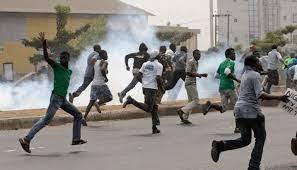By Ezrel Tabiowo and Taiye Odewale
Abuja
Hope for possible reversal of 45 per cent hike in electricity tariff by the Nigeria Electricity Regulatory Commission (NERC) in January, this year, was dashed yesterday as the agency and the Minister of Power, Works and Housing, Babatunde Fashola, declared the decision as irreversible.
Fashola and the NERC acting Chairman, Dr Anthony Akah , made the declaration to the Senate’s joint Committee on Labour and Power during a public hearing session on the electricity tariff hike as mandated by the Senate in February when a motion was moved to that effect by its Chairman, Committee on Labour, Nazif Suleiman (APC, Bauchi North).
The Senate had, in its resolutions on the motion, aside from ordering for the public hearing, ordered the reversal of the tariff hike by NERC which was, however, not complied with.
Explaining his refusal of obeying the directive, the NERC boss told the joint committee that obeying such directive would have created series of avoidable setbacks in the sector like a market gap of about N575 billion which would have compounded the initial market gap of N187 billion the take off tariff slammed on investors.
He said aside from that six generating companies (GENCOs) had, before the Senate’s resolution, dragged NERC to court over the tariff hike and that they cannot do final order on reversal of tariff since the process that led to it was in compliance with Section 76 sub-section 8 of the Act guiding the operations of the Commission.
A submission supported by the Minister of Power, Works and Housing, Babatunde Fashola, who said the sector needed the market reflective tariff to survive. He said basket of indices led to the hike like borrowing rate for the investors, exchange rate, availability and cost of gas, etc.
“One of the reasons the tariff has go up was that a major component, a significant number of our power plant depends on gas out of about 26 power plants that we have only about three are hydro.
“We were heavily dependent on gas, people were exporting gas because gas was selling outside the country at $4 and it was selling for domestic use at $1.30, government reviewed that price to $3.30 and it is the primary component for manufacturing. Power has come up it should make sense unless government decides to subsidise it.”
According to the Minister, even with the recent hike in electricity tariff, Nigeria still ranks among countries with low tariffs in Africa and by extension, in the world.
He put it to the lawmakers that since 2005 when power privatization process started till 2013 when the major generating (GENCOs) and Distribution (DISCOs) were handed over to investors, every segment of government was involved and if there is any failure now, it should be for all and not a particular group.
“Enabling laws for the process, were passed by the National Assembly in 2005, process completed by the executive in 2013. If the process was bad, where was oversight?”
He pleaded with the lawmakers and Nigerians to be more patient with government and investors on the process as three years is not enough to judge its success or failure.
However, the chairmen of the joint committees, Nazif Suleiman and James Manager, along with their members, insisted that the tariff as it is now, without commensurate power supply for Nigerians, is unacceptable.
The public hearing continues today.



